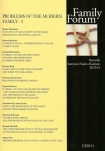Status i znaczenie rodziny dla gospodarki w ustroju wolnorynkowym
Status and importance of the family for the free-market economy
Author(s): Stanisław Fel, Maria Anna FurtakSubject(s): Christian Theology and Religion
Published by: Uniwersytet Opolski
Keywords: family; human capital; family policy; free market economy
Summary/Abstract: Family as a historical category has undergone many transformations in the course of history; these transformations were characteristic of various eras. Despite the change of the meaning and model of the family, it has an irreplaceable role for the modern system of the free-market economy, which expresses itself especially in the creation and development of human capital. Human capital considered as the main factor of economic development finds nowhere else such a favorable environment for the emergence and development as in the family. It entails, however, a necessity of bearing considerable costs to ensure its members a better chance of success in professional and social life. As a result, this situation is rebound on the demographic structure of society, because parents reduce the number of children by reason of the necessary input as they want to invest in the ’quality’ of their children’s human capital. Based on the demands for social justice and having regard to the future fate of the aging societies, it is necessary to undertake appropriate action on the grounds of social policy. These activities should be focused in particular on the equitable distribution of burdens, and thus opportunities for the social and professional success of individuals and families, the success that leads to a higher level of social and economic development of the wider community.
Journal: Family Forum
- Issue Year: 2011
- Issue No: 1
- Page Range: 111-131
- Page Count: 21
- Language: Polish

